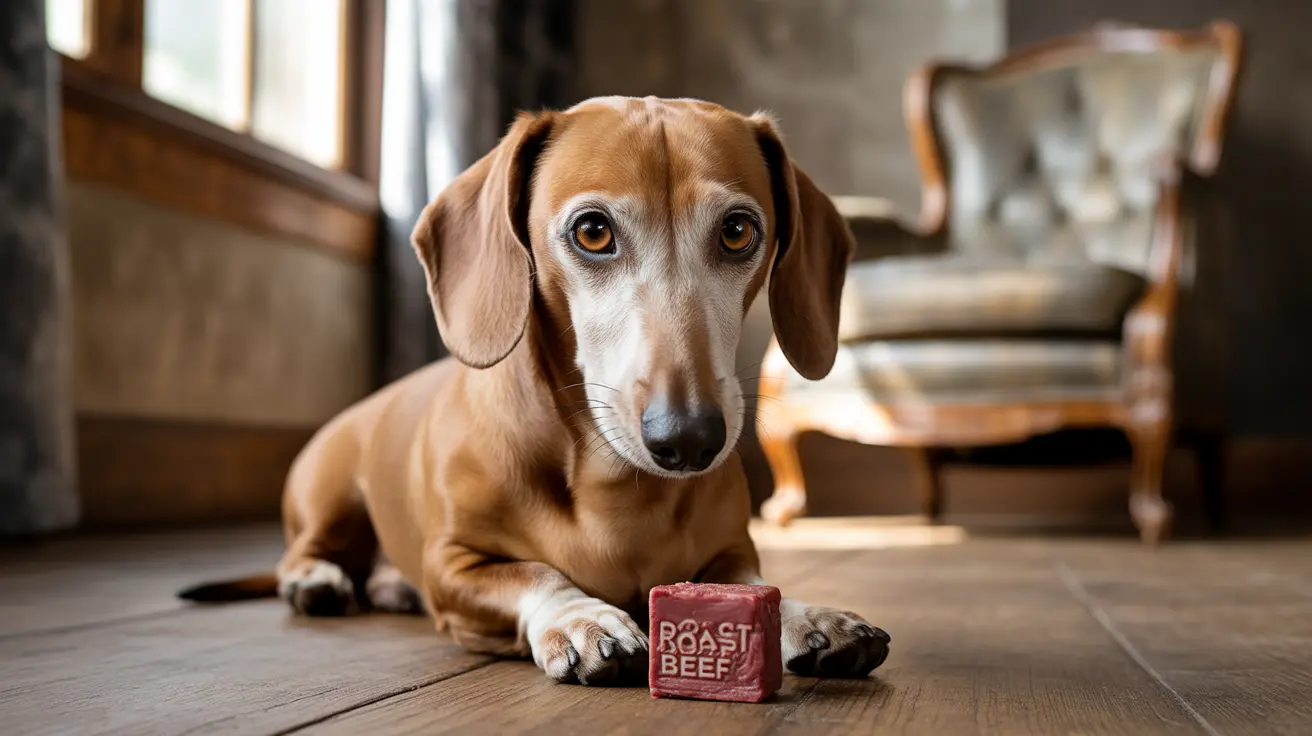Introduction
Many dog owners wonder "can dogs have roast beef?" as they look to share this protein-rich food with their furry friends. While plain, well-cooked roast beef can be a healthy occasional treat for dogs, there are important guidelines to follow and potential risks to consider. This comprehensive guide will help you understand when and how to safely incorporate roast beef into your dog's diet.
Benefits of Feeding Roast Beef to Dogs
Roast beef offers several nutritional advantages when served properly:
- High-quality protein for muscle maintenance and growth
- Essential B vitamins, particularly B12 and B6
- Important minerals including iron, zinc, and selenium
- Omega-3 fatty acids for coat and skin health
- Natural amino acids supporting overall metabolism
Safe Preparation Guidelines
Cooking and Preparation
When preparing roast beef for your dog, follow these essential safety steps:
- Cook thoroughly to eliminate harmful bacteria
- Avoid all seasonings, including salt, garlic, and onions
- Remove all visible fat
- Never include bones, which can splinter and cause injury
- Cut into small, manageable pieces
Portion Control
Moderation is crucial when feeding roast beef to dogs:
- Limit treats to 10% of daily caloric intake
- Start with small amounts to test tolerance
- Consider your dog's size when determining portion size
- Reduce regular meal portions when offering roast beef
Potential Risks and Concerns
Health Risks
Be aware of these potential complications:
- Pancreatitis from high fat content
- Gastrointestinal upset
- Food allergies (beef is a common allergen)
- Weight gain if overfed
- Choking hazards if not properly prepared
When to Avoid Roast Beef
Don't feed roast beef to your dog if:
- They have a history of pancreatitis
- They're allergic to beef
- The meat contains seasonings or marinades
- It's processed deli meat
- Your dog is on a restricted diet
Monitoring Your Dog
After feeding roast beef, watch for these signs of problems:
- Vomiting or diarrhea
- Lethargy
- Loss of appetite
- Excessive thirst
- Allergic reactions (itching, redness, swelling)
Frequently Asked Questions
Can dogs safely eat roast beef, and what are the health benefits?
Yes, dogs can safely eat plain, well-cooked roast beef in moderation. It provides high-quality protein, essential vitamins, and minerals that support muscle health, immune function, and overall vitality.
How should I prepare roast beef before giving it to my dog to avoid health risks?
Cook the roast beef thoroughly without any seasonings, remove all visible fat and bones, and cut it into small, manageable pieces. Serve at room temperature and never use marinades or seasonings.
What are the potential health risks of feeding roast beef to dogs, such as pancreatitis or allergies?
The main risks include pancreatitis from high fat content, allergic reactions in sensitive dogs, and digestive upset if fed in large quantities. Some dogs may also experience food allergies to beef proteins.
Is it safe to feed my dog roast beef bones or fatty cuts of roast beef?
No, never feed your dog roast beef bones as they can splinter and cause serious internal injury. Fatty cuts should also be avoided as they can lead to pancreatitis and obesity.
How often and in what portions can I give roast beef to my dog as a treat?
Roast beef should make up no more than 10% of your dog's daily caloric intake. Offer small portions as an occasional treat, not as a regular meal replacement. The exact amount depends on your dog's size and overall health.
Conclusion
When properly prepared and served in moderation, roast beef can be a safe and nutritious treat for most dogs. Always prioritize lean cuts, proper preparation, and portion control. If you notice any adverse reactions, discontinue feeding roast beef and consult your veterinarian. Remember that while treats like roast beef can be part of a healthy diet, they should never replace your dog's regular, balanced dog food.






